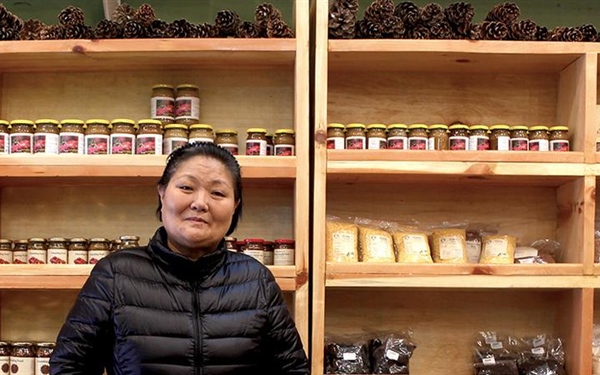Bhutan's New Organic Food Movement
Meet the Bhutanese entrepreneur working on organic food production, heritage and education.
 Kesang Choedon at Chuniding Food in Thimphu.
(Source: Druksell.com)
Kesang Choedon at Chuniding Food in Thimphu.
(Source: Druksell.com)
By Hannes Lorenzen | Ecologist
Kesang Choedon has created an innovative organic and heritage food enterprise near Thimphu, the Bhutanese capital. Formerly a police officer, Choedon employs and trains 30 young women in processing and marketing of Bhutan’s local food treasures.
The enterprise includes the processing of nearly 150 different organic food ingredients from a wide range of local products including dried fruit and vegetables, cereals, pulses, health drinks, herb teas and spices. These products are sold in an organic shop, and offered in a Folk Heritage Restaurant in the capital.
Choedon is eager to further expand her facilities, products and training to young Bhutanese people. Her intention is to create and strengthen a new organic food movement that builds upon food traditions but also brings healthy and tasty food to Bhutanese people
Some people in Bhutan consider you as pioneer of a new food movement. Would you agree?
I am not sure whether I am a pioneer in the literal sense. The nature of my work led to working directly with farmers and the need to be supply our people with naturally grown good food.
If Bhutan is to be turning toward 100 percent organic, then farmers, processors and consumers need to work together. Some may believe that our food is already organic, because most of our farmers do not use any chemicals or fertilizers. But in fact there is only a very small organic market and there is a risk that non-organic methods come sneaking in.
I consider my food business as an invitation to farmers to create their own organic market and as an invitation to consumers to value what we have in Bhutan: very nutritious and tasty local food.
You started your food business ten years ago to preserve and develop Bhutanese food culture. Was it difficult to find farmers who would work with you?
Not at all. The problem was getting started and getting the quantities right. Sometimes I would have far too much, sometimes far too little.
So I decided to dry food so that I would be able to balance what I received and what I could store - fruit, vegetables, pulses, cereals. That gave me time to find outlets. The shop helped and of course the restaurant.
There was no organic certification and control at that time. How could you trust that you got the quality you wanted?
I was relying on my own sense and the sense of friends who helped me to find farmers who were ready to cooperate.
Bhutan is a big family you know. And in the villages we keep an eye on each other. With the help of the government’s extension service we had quickly built up a group organizing and checking the buying up.
We have the Bhutanese organic certification now but I would like to say that certification may not be necessary for the local market (but would be necessary for exports).
You were a police officer before you started your food business. Why did you leave your career in the civil service and go it alone?
I was very lucky to be one of the first women offered a career when the government decided to employ women in security services.
It was an exciting time. I love investigations. At that time, it was still an adventure to be officer in the countryside: no roads, no cars, walking in the mountains, crossing rivers at night, sleeping in cowsheds on farms in the forest and so on.
And it was already during that time that my sense for food had emerged from the food that we were offered at the farms. Then there was my grandmother’s food that was irresistibly good. Both, my grandmothers’ and our farmers’ food were the reasons that I dropped the job.
It was not an easy decision at all. I think it was the day when I had read some reviews about the bad image Bhutanese food has. I was suddenly sure that my passion for our own Bhutanese food was stronger than remaining in the police services.
I had no bad conscience that I would not properly serve my country any more – you know we feel very responsible in Bhutan to serve our country - I was just sure my service for our country would be to preserve our food.
You are passionate about drawing young people into a new food movement - you employ and train thirty young women. Is food still best taken care of by women?
I have only employed young women. Girls are in general more ambitious and innovative then men.
Women often do not find jobs when it comes to plumbing, fixing electrical lines and cement works, as they are risky and require physical strength. I focus on young women who are jobless for some reason, including school drop-outs. And I want them to understand how important and fascinating working with food is.
The girls in my staff stay with me between three to ten years. They like the teamwork and I encourage them to take their own projects and initiatives in hand and develop them further.
I always said to myself: if you feel like doing it, go for it, be your own master. My daughter and two nieces are managing the shop and the restaurant by the way. I believe women will do the job of bringing our local food and organic farming right into the center of Bhutanese culture.
You are building your business and your ambition for an organic food movement on food heritage and on food education. Do you also believe that a change of Bhutan’s farm and food policy could help to achieve the declared goal to become the first country in the world with 100 percent organic farming?
Policies can help, if the people carry them. We have the advantage that our King and our Government want to go that way. But people seem to believe that we are already there, and that is not the case.
Our subsistence farmers farm without chemicals but not necessarily organic. There are practices missing like crop rotation and good water management that make farming resilient on the long run.
But also consumers are not aware of how important it is that they choose local and seasonal food from Bhutan to support farmers in their effort to go organic.
Finally it is an educational job. We have to teach food culture at schools and talk more about it. I was very lucky because I could tap into my grandmother’s vast cooking, preservation and food knowledge. She lived to 110 years old, so I had time to “absorb” her treasure of recipes and I could build upon that to develop my enterprise.
I am very keen to hand that on to my daughters and to the young people working with me. I believe our food culture is deeply linked also to our religion and our strong relation to nature.
We are doing a religious offering called “du-na-gu”, the nine cereal grains. They stand for common wealth, for diversity and for generosity, in a sense for what we get from nature and what we share. I have offered these nine cereal grains in my shop, and I teach people how to cook them. This is how we build upon tradition and move towards a healthy and sustainable future.
About the author
Hannes Lorenzen is senior advisor to the Committee on Agriculture and Rural Development of the European Parliament in Brussels and Strasbourg.
This article was first published in Ecologist and has been edited for the Daily Bhutan.




